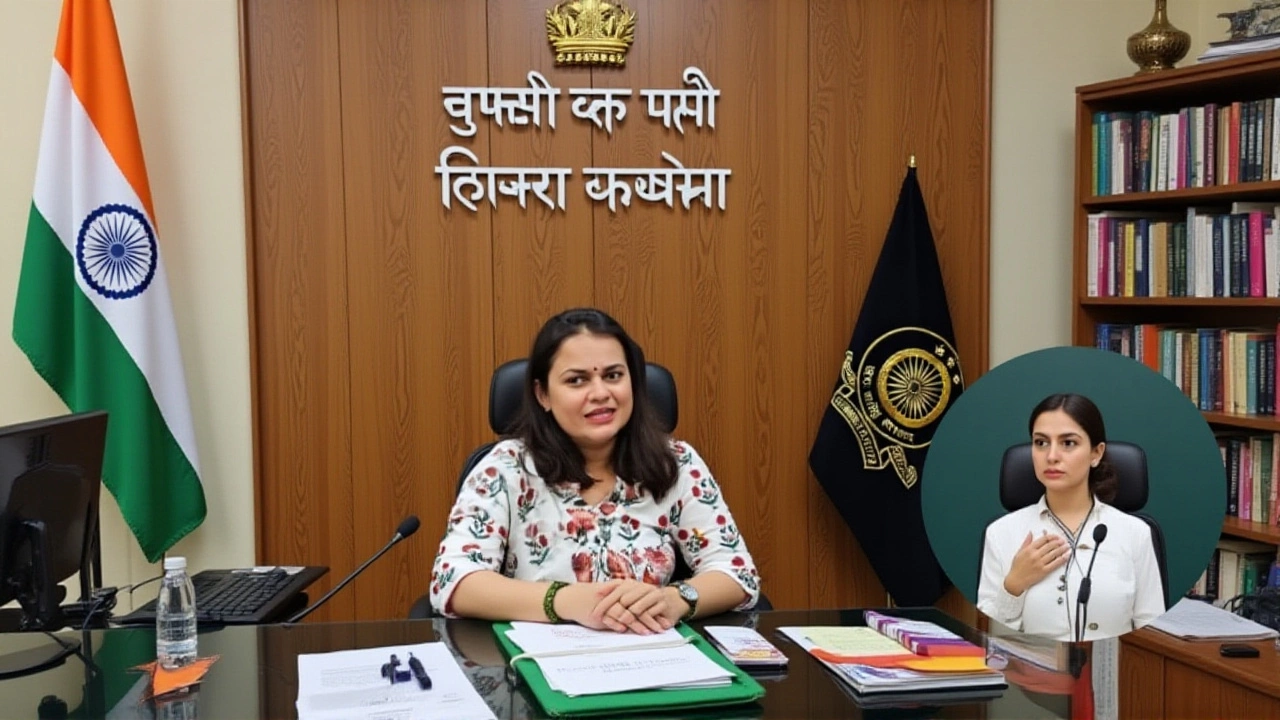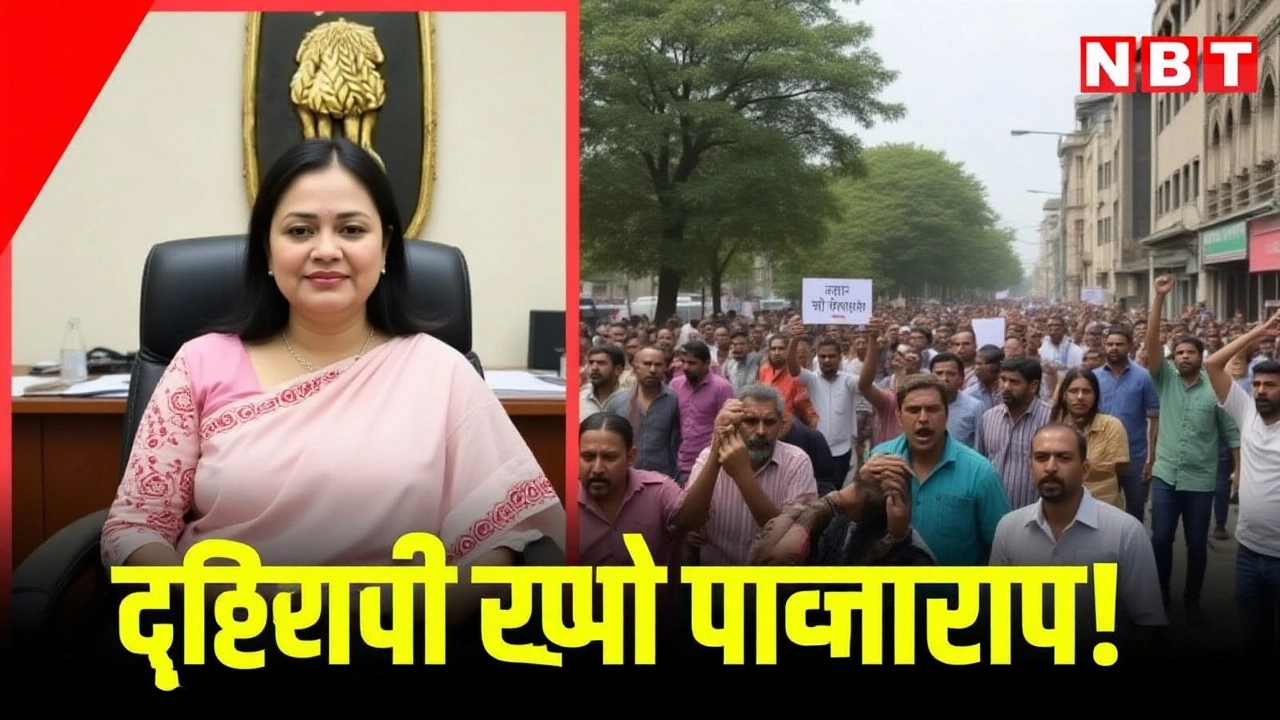On October 9, 2024, Tina Dabi, the 2015 UPSC topper and Rajasthan-cadre IAS officer, led a surprise raid on a spa center in Rajasthan amid allegations of a sex racket. The operation, which left local business owners reeling, has ignited a fierce debate—not just over moral enforcement, but over the human cost of rigid bureaucratic action. Within days, shopkeepers claimed they were given no warning, no chance to respond, and now face permanent closure with no safety net. Her actions have become a lightning rod for a deeper conflict: when does public service become overreach? And who pays the price when rules are applied without mercy?
The Raid and the Fallout
The spa raid wasn’t an isolated incident. Since joining the Rajasthan cadre, Dabi has built a reputation for aggressive, high-profile interventions: sweeping streets in Jaipur, reprimanding negligent hospital staff, and now, shutting down businesses on suspicion alone. Locals say the pattern is clear—action without consultation, enforcement without rehabilitation. One spa owner, who asked not to be named, told reporters: "We’ve been here 12 years. Five employees lost their jobs overnight. No notice. No hearing. Just a police van and a signed order. What are we supposed to do?"
There’s no official record of the spa being convicted of any crime. The raid was based on anonymous tips. Yet, the damage is done. Business licenses are suspended. Workers—many of them women from low-income families—are now begging for daily wage work. The Rajasthan government has stayed silent. No press release. No inquiry. Just radio silence.
A Political Shadow? The Satish Poonia Footage
Then came the video. On October 25, 2024, footage surfaced showing Dabi greeting BJP leader Satish Poonia five times in seven seconds. The clip, widely shared on social media, raised eyebrows. Civil servants are supposed to be neutral. But this wasn’t just a nod—it was repeated, deliberate, almost ceremonial. Critics point to the timing: just weeks after the raid, during a period of heightened political tension in Rajasthan. Was this a coincidence? Or a signal? The Department of Personnel and Training (DoPT) has yet to comment on whether such conduct violates service rules.
The Reservation Precedent: How Dabi’s Case Is Reshaping India’s Exam System
But the most consequential ripple effect isn’t in Rajasthan—it’s in Madhya Pradesh. The Jabalpur High Court recently stayed the MPPSC 2025 Mains exam after petitioners challenged Rule 4 of the MP State Service Examination Rules, 2015. The rule, which bars candidates from switching categories after availing reservation benefits in Prelims, cites Tina Dabi’s 2015 UPSC result as binding precedent.
Dabi, who cleared the Prelims under the Scheduled Caste (SC) cutoff but scored the highest overall marks (1063) in the Mains, was still allotted her seat under the SC quota. She wasn’t moved to the unreserved category, despite her rank. That decision, upheld by the Supreme Court, became a legal anchor. Now, MPPSC is using it to lock hundreds of reserved-category candidates into their initial category—even if they outscore everyone else.
The numbers are staggering. Of 1,140 candidates selected under the "unreserved" category for the 2025 exam, 690 came from reserved categories: 42 SC, 5 ST, 381 OBC, and 262 EWS. Only 450 were genuinely from the general category. Legal experts call it a paradox: the system rewards merit in the Mains, but punishes it in the Prelims. "It’s like saying you can win the marathon, but you’re not allowed to claim the gold medal because you started in the slow lane," said Dr. Anjali Mehta, a constitutional scholar at Delhi University.

The Water Conservation Paradox
It’s easy to forget that Dabi wasn’t always a controversial figure. In 2023, she was awarded the inaugural Jal Sanchay Jan Bhagidari Award by President Droupadi Murmu—and a ₹2 crore prize—for pioneering a technique to extract water from sand in Barmer district. The project, she claimed, helped 12 villages survive drought. Yet, contradictory reports from November 2025 suggest both Tina and her sister, Ria Dabi (2020 UPSC topper, same cadre), were later criticized by local NGOs for failing to scale the initiative. No official response followed.
Family Ties and Personal Turns
Dabi’s personal life is as layered as her career. Her father served in the Indian Telecommunication Service; her mother, an Indian Engineering Service officer, retired to raise her daughters. Ria, her younger sister, cleared the UPSC in 2020 and now serves alongside her in Rajasthan. In 2022, Dabi married Dr. Pradeep Gawande, a 2013-batch IAS officer from the same cadre. Their union came after her divorce from Athar Aamir Khan, the 2015 UPSC rank holder who came second. A Family Court in Jaipur granted the divorce on an unspecified Tuesday, as reported by Live Hindustan.

What’s Next?
The Jabalpur High Court’s crucial hearing on May 6, 2025, will determine whether Dabi’s case remains a precedent for reservation policy—or becomes a cautionary tale. Meanwhile, in Rajasthan, a petition has been filed by affected spa workers demanding compensation and reemployment. The DoPT has yet to respond to allegations of political overreach.
The bigger question lingers: Is Dabi enforcing the law—or rewriting it with her own moral compass? And in a country where bureaucracy holds immense power, who watches the watchers?
Frequently Asked Questions
How did Tina Dabi’s UPSC result influence reservation rules in Madhya Pradesh?
Tina Dabi cleared the UPSC Prelims under the Scheduled Caste (SC) cutoff in 2015 but topped the Mains with 1063 marks. Despite her overall rank, she was allocated a seat under the SC quota, not the unreserved category. This became a legal precedent cited by the Madhya Pradesh Public Service Commission to enforce Rule 4 of its 2015 examination rules, which prevents candidates from switching categories after availing reservation benefits in Prelims—even if they score higher later. This has locked hundreds of meritorious reserved-category candidates into their initial category.
Why is the spa raid in Rajasthan controversial beyond the sex racket allegation?
The controversy isn’t just about the raid’s legitimacy—it’s about process. Business owners say they received no notice, no opportunity to respond, and now face permanent closure with no rehabilitation. No court order or formal charge has been made public. Critics argue this reflects a pattern of enforcement without due process, disproportionately impacting low-income workers—many of them women—who rely on these jobs for survival. The absence of any government response has deepened public distrust.
What’s the connection between Tina Dabi and BJP leader Satish Poonia?
A video from October 25, 2024, shows Dabi greeting BJP leader Satish Poonia five times within seven seconds, raising concerns about political alignment. As a civil servant, Dabi is expected to remain politically neutral. While no formal complaint has been filed, the timing—just after a high-profile raid—has led to speculation about whether her enforcement actions were politically motivated. The Department of Personnel and Training has not addressed the footage.
How does Tina Dabi’s case affect other reserved-category candidates?
Dabi’s precedent means that even if a reserved-category candidate tops the Mains, they may still be confined to their initial category quota, losing the chance to compete for unreserved seats. This has led to 690 out of 1,140 "unreserved" selections in the MPPSC 2025 exam actually coming from reserved categories, crowding out genuinely general-category candidates. Legal experts warn this undermines meritocracy and creates resentment among all groups.
Is there evidence Tina Dabi’s water conservation project failed?
While Dabi received a ₹2 crore award from President Murmu in 2023 for her sand-water extraction model in Barmer, a November 2025 report from Portal do Holanda claimed both she and her sister Ria were criticized by local NGOs for failing to scale the initiative. No official rebuttal or audit has been published. This contradiction adds to public skepticism about the transparency of her achievements.
What will happen on May 6, 2025, in the Jabalpur High Court?
On May 6, 2025, the Jabalpur High Court will hear arguments on whether Rule 4 of the MPPSC examination rules—citing Tina Dabi’s UPSC case—is constitutional. The General Administration Department of Madhya Pradesh will defend the rule using Supreme Court precedents, including Dabi’s. If the court strikes it down, it could reshape how reservation policies are applied across all central and state exams, potentially allowing top performers to compete in the general category regardless of Prelims category.

Hi, I'm Arvind Khatri, a multifaceted expert in health care, news, and sports. With a passion for Indian news and sports, I enjoy writing about the latest happenings and trends in these fields. My background in health care allows me to provide valuable insights into the impact on society and individuals alike. I am dedicated to sharing my knowledge and expertise with others to make a positive impact in their lives.